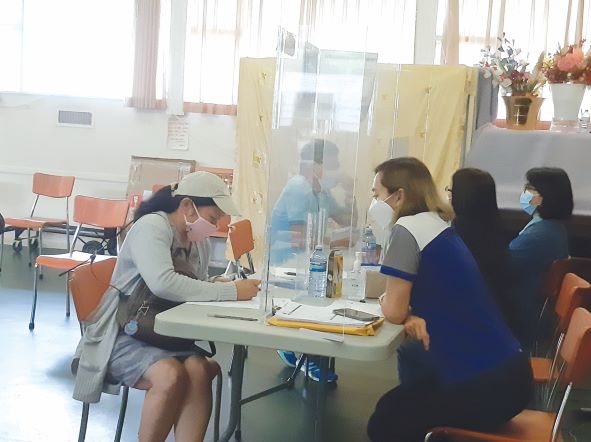1SAMBAYAN Canada Chapter and the Malaya Movement Canada had just sent its letter last week asking to extend the voting registration in the Philippines and overseas when the Philippine Commission on Elections (COMELEC) announced that it was not going to do so.
COMELEC said an extension would “cause corresponding delays in all other preparatory activities, especially those that depend on the finalization of the list of voters. “
1Sambayan’s letter was addressed to COMELEC Commissioner Rowena Guanzon, cc: DFA Secretary Teodoro Locsin, Jr and Ambassador to Canada Rodolfo Robles. It was signed by 1Sambayan Canada Chapter, Malaya Movement Canada, joined by 20 groups and organizations with an estimated combined membership of at least a thousand members and national and/or provincial outreach, and 20 individuals from the arts, the UP, the business world, including a retired member of the Philippine Military Academy. They represented part of the overseas Filipinos in Canada who are serious with protecting their right to vote (which they cannot exercise if they are not registered under COMELEC rules). Here is the text of the letter that was sent to COMELEC:
“In March 2020, when the COVID-19 crisis was declared a pandemic, Canada started its emergency lockdown which resulted in the closure of offices, businesses, schools, including the Philippine Embassy and the consular offices across Canada.
It has only been this July 2021 that restrictions for gatherings and travelling were recently relaxed in Canada’s ten provinces and three territories. However, the pandemic is not over. The policies and protocols can be altered based on changes in the pandemic situation, i.e., any increase in COVID-19 cases anywhere in Canada could mean a return to restrictions in gathering and in travelling.
There is one Philippine Embassy in Ottawa and three Consulates General (Vancouver, Toronto, and Calgary) that provide consular services for 837,130 Filipinos (Census of 2016) in Canada, the Filipinos being the third largest visible minority population in Canada.
The current OAV registration rules are full of challenges and barriers for qualified registrants and will disenfranchise hundreds of thousands of voters. These current rules will deprive many overseas Filipinos of their right to vote.
- We ask that the COMELEC extend the September 30, 2021 deadline of the Overseas Absentee Voting to a later date to give more time for qualified overseas Filipinos to register. A major consideration is we are still under the COVID-19 pandemic after a year and a half. If qualified voters do not and cannot register, then they cannot exercise their right to vote in the May 2022 elections.
- We ask that the rules for OAV voting be revised to make the personal appearance at the Embassy or Consular offices optional, instead of mandatory. The barriers in the registration process, such as the mandatory appearance at the Embassy or consular offices, make it difficult and inaccessible for the qualified Filipino voters in Canada to register. If they cannot complete the registration process, they cannot vote. For qualified Filipino voters not living near the Embassy and the Consulates General in those cities, visiting these offices means travelling by plane, by train, ferry, or car which may take hours to a couple of days.
- We ask that the Embassy and the Consulates General, if they haven’t yet, to set up consular outreach programs and mobile missions in the community to make the registration process accessible to the Filipino qualified overseas voters. For the offices that do provide these services, we ask for more outreach to make the voter registration accessible and doable. More time with the deadline extension will mean more outreach services.
We hope that the COMELEC will take our issues and concerns seriously. Overseas Filipinos will register and vote when the barriers and challenges are taken away. We want our votes to be counted for the May 2022 Philippine elections.” [end]
The COMELEC decision came despite loud calls from groups in the Philippines to extend the voting registration: Philippine lawmakers, the Kabataan Partylist, at least 60 youth organizations, and the poll watchdog Legal Network for Truthful Elections (LENTE). Rappler reported that in the first year of COVID-19, voter registration was suspended for almost six months. In 2021, with the modified emergency community quarantine until the end of August, many areas would have lost 50 days of voter registration.
It seems COMELEC does not realize that it is not only the Philippines reeling from the pandemic, made worse by the Lambda variant, but it is also the whole world where overseas Filipinos live and work. That the COMELEC would rather put the public health and safety of millions of Filipinos at risk should they try to register at this time is disturbing. The rigid stance of COMELEC to keep on top of their schedule no matter the pandemic is shameful. It forgets that without voters, there are no elections, and no elections mean there would be no COMELEC.
The issue of extension, voter disenfranchisement and public health and safety brings to the spotlight that the terrible conditions suffered by the Filipino people even before the pandemic (hunger, poverty, joblessness, underemployment, no decent sustaining wages, lack of basic services, etc.) are aggravated by the Duterte government’s failed pandemic response, his militarist approach to a public health problem, his criminal neglect and shameless abandonment of frontline workers, patients, and overseas Filipinos and their families.
No registration, no right to vote. So, when millions of Filipinos cannot vote to say “NO” to a return to authoritarianism, to an end to Duterte rule from himself, his daughter, cronies, relatives, and friends and when they cannot vote to say “YES” to good governance, respect for human rights, defense of Philippine sovereignty, to decent jobs back in the Philippines, etc., what is the wisdom that we take from here? What is the non-voter’s education lesson here?
Are we saying that for change to happen, we need to look elsewhere?
Maybe I should ask COMELEC.
